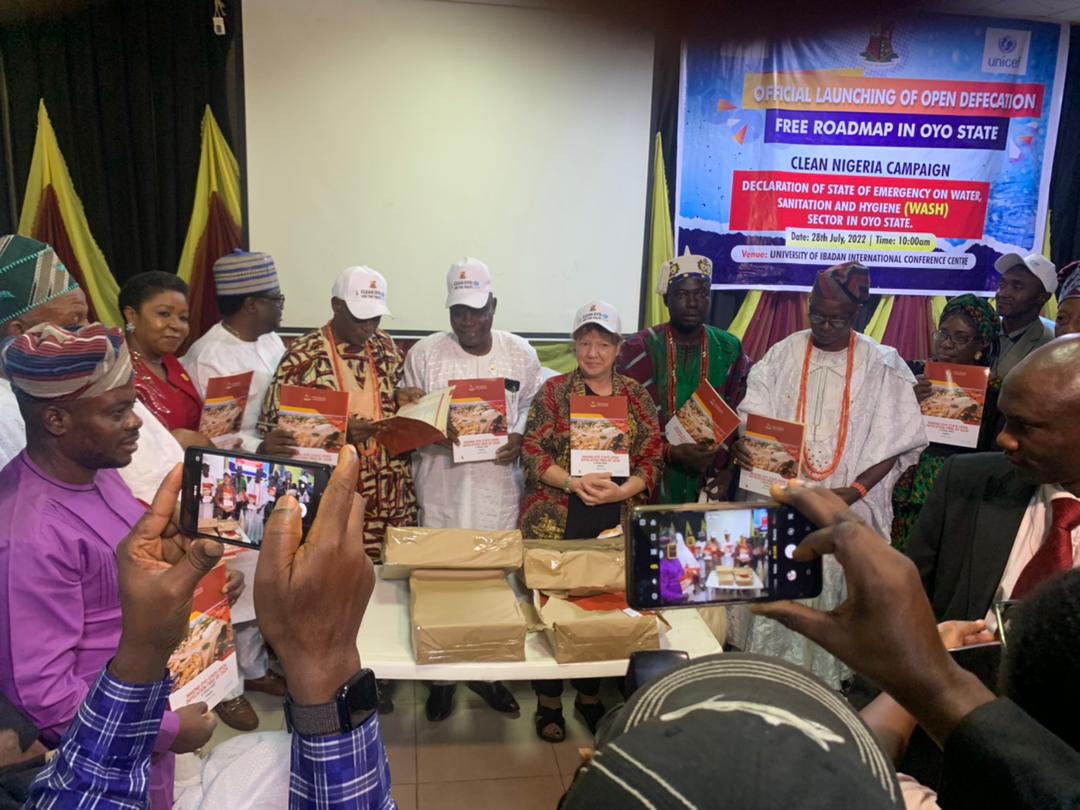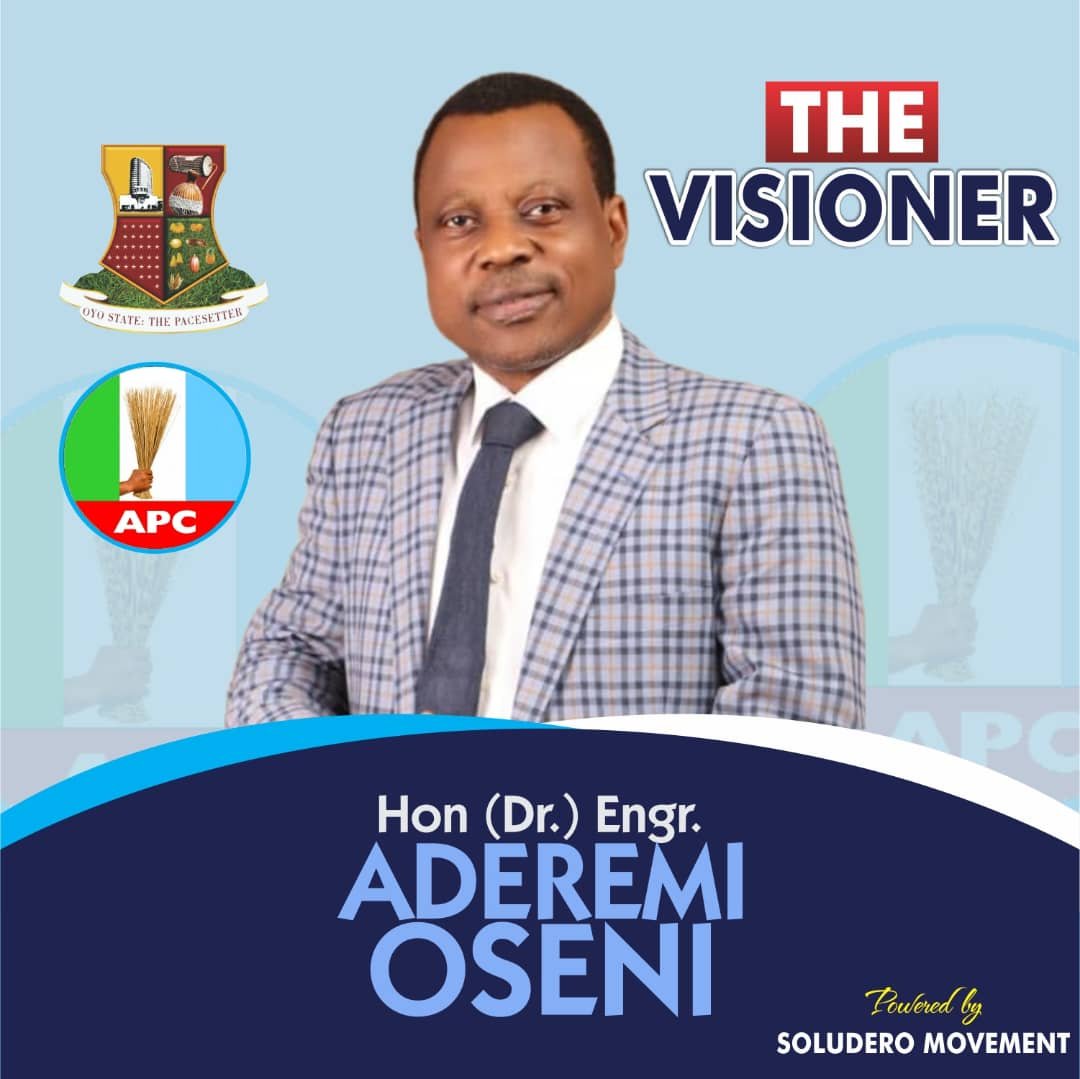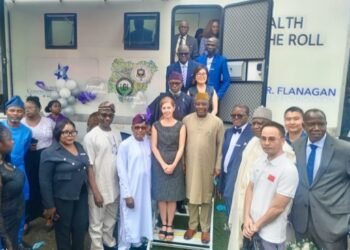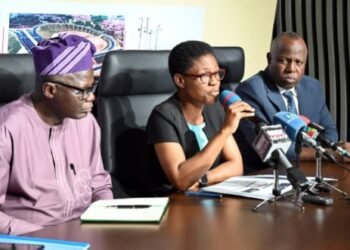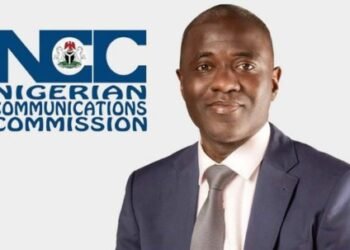The Oyo State government has expressed its determination and readiness to make the state open defecation free by 2028, through an enhanced and improved Water, Sanitation and Hygiene (WASH) Sector.
Nigeria has a plan to end open defecation in all the 36 states by 2025 and the United Nations Children’s Emergency Fund (UNICEF) is supporting the country to achieve the goal, in line with the Sustainable Development Goal (SDG) 6 of ensuring availability and sustainable management of water and sanitation for all.
However, as a laudable as the declaration by state government is, a recent report by UNICEF Nigeria revealed Oyo as one of the occupants of the lowest rung of the ladder in the ratings of states keeping to rules and regulations guiding against open defecation across the country.
UNICEF Nigeria, The Oyo State government has expressed its determination and readiness to make the state open defecation free by 2028, through an enhanced and improved Water, Sanitation and Hygiene (WASH) Sector. WASH, during a “One Day Media Dialogue On The Launch of Open Defecation Free (ODF) Roadmap in Oyo State, held on Wednesday at Kakanfo Inn, Ring Road, Ibadan, disclosed that the state has the most open ‘defecators’ across the country.
Using a statistic obtained from the National Bureau of Statistics (NBS), the WASHNORM 2021 Report, in its “Oyo State Fact Sheet” rated the state high in access to basic water supply services, but scored it very low in the areas of sanitation and hygiene.
A breakdown of the WASHNORM 2021 Report revealed that: 79 per cent of the population in the state have access to basic water supply; 14 per cent of the population have access to safely managed sanitation; while eight (8) per cent have access to basic hygiene services.
The Report further stated: 55 per cent of people living in Oyo State drink water contaminated with E.coli, either from the source or at the household level; 54 per cent of the population in the state practice open defecation; while 10 per cent of schools, 0.4 per cent of health care facilities and 0.4 per cent of public places have access to to basic WASH facilities.
However, as alarming as the statistics are, the Oyo State government, UNICEF and other critical stakeholders have picked up the gauntlet to reverse the ugly trend. They agreed that the challenges of making the state Open Defecation Free (ODF), though daunting, are not insurmountable.
The Governor ‘Seyi Makinde-led administration thus declared its determination to work in collaboration with UNICEF and eradicate the menace of open defecation in the state.
The governor made the declaration at the official launching of the Open Defecation Free (ODF) Roadmap In Oyo State, Clean Nigeria Campaign and Declaration of Emergency on the Water, Sanitation and Hygiene (WASH) Sector in the state, held on Thursday at the Gamaliel Onosode Hall, International Conference Centre (ICC), University of Ibadan.
Governor Makinde expressed optimism in the workability of the ODF Roadmap and sternly admonished residents of the state to always maintain safe, clean and healthy environment.
The governor, represented by his deputy, Chief Bayo Lawal, said his administration keyed into the project in line with its vision to make the state clean and to eradicate the challenge of open defecation.
He said the state would do everything possible to bridge the wide gap of access to public toilets and appealed to UNICEF to spread the ODF pilot project, ongoing at Ona-Ara Local Government Area, to the remaining 32 local councils in the state, especially to encompass the rural areas.
He disclosed that the Open Defecation Bill passed by the Oyo State House Assembly, will soon be assented to, adding that the Bill will take care of not only environmental cleanliness but also deal with those that will run foul of government policies.
Makinde said: “Statistically, by ranking, UNICEF said Oyo State is second in the open defecation index. That is too bad for us and I think the purpose of this gathering is to create awareness so that we will know where we stand in things of this nature. I want to say that, as a government, we embrace this challenge frontally.
“One thing that is key is, in order for healthy environment to sprout, germinate and grow, it requires the effort of all of us. Within the metropolis, we are facing a lot of challenges as we empty our refuse.
“The Ministry of Environment, Waste Management Board and the rest are doing their best to ensure that refuse are cleared regularly. But we need a lot more to do in term of creating awareness and I think that engagement is ongoing as we speak.
“The other point that I want to touch on has to do with the office of UNICEF. Oyo State is singled out as a pilot state for UNICEF projects around the western states. Now, if that is the case, we will need their presence in Oyo State very strongly.
“I understand that they have an office in a particular state in the South-West but their activities are more in Oyo State. Commonsense, logic and reasoning demand that your office must be situated in Oyo State.
“I think we will plead with UNICEF to spread the kind of pilot project that is ongoing at Ona-Ara to all local governments in Oyo State.
“Actually, as the Olubadan of Ibadanland said, we need more of such pilot projects in the rural areas more than in the cities. So, we plead with you to look into how you can spread your pilot projects to cover many more local governments.
“Finally, I need also to add that, as the Deputy Speaker of the Oyo State House of Assembly, Honourable Abiodun Fadeyi, indicated, legislation is key to driving whatever policies government puts in place.
“We will ensure that sooner than later, the Bills that are being worked upon will be looked into by government and the state legislature, with a view to formulating, correcting and putting in adequate legislation that will take care of, not only environmental cleanliness, but even those who will run foul of whatever policies government puts in place.
“We pledge, as a state, that we will continue to cooperate and collaborate with all agencies that relate to poverty reduction, by providing clean and open defecation free society.”
Deputy Speaker of the Oyo State House of Assembly, Honourable Abiodun Fadeyi, said the launching of the Roadmap on attaining ODF in the state came at the right time, in tandem with the activities of the state legislature on open defecation.
He said building houses without having toilets is not acceptable in the 21st Century, noting that the roadmap can only succeed by creating an enabling law and with enough sensitisation of the people of the state.
Also speaking, National Coordinator, Clean Nigeria Campaign, Mrs Chisom Okpara, said more than 80 million Nigerians are still defecating in the open, but expressed optimism that, with the positive response from some states, there is still hope of attaining ODF in all parts of the country.
She cited the example of Jigawa State attaining the ODF status very soon as, according to her, 26 out of the 27 local government areas in the state have been certified as open defecation free.
The Clean Nigeria Campaign coordinator also disclosed that beyond healthy living derivable from the WASH reforms, embracing sanitation and hygiene can create a lot of job and business opportunities for the populace.
In her remark, Chief of WASH, UNICEF Nigeria, Dr Jane Bevan, disclosed that Jigawa and Katsina states are on the verge of being declared open defecation free, while Benue, Bauchi, Cross River, Kaduna and Anambra states have large numbers of their local councils already declared ODF.
She said, in the South-West, only Ifedayo Local Government Area of Osun State has been declared ODF, adding that Oyo State has the potentials to be the flag-bearer and pace-setter for ODF in the region.
Dr Bevan also spoke on the importance of sanitation and hygiene for any society, especially the provision of toilets, saying; “One may be wondering, Why Promote use of toilets”?
She said: “Various studies have revealed that, with safe defecation and appropriate hand washing, it is possible to break more than 50 per cent of the faeco-oral transmission routes and would be able to prevent diseases like typhoid, worm infestations, conjunctivitis, cholera and diarrhoeal diseases.
“In essence, using the toilet and washing our hands results in good health as well as improving our social status and maintaining our dignity.
“UNICEF supports the Ministry of Water [Resources] to monitor WASH coverage in Nigeria through the WASH NORM. The most recent WASH NORM data for Oyo paints a quite alarming picture, indicating that only 20 per cent of schools in the state have access to basic sanitation, after defecation; before and after eating; after clearing child’s excreta and cleaning child’s anus; before food preparation; after contact with soil and less than one per cent of health care facilities.
“Institutions such as these, where children are born and go to be educated, are perhaps the most crucial places to have safe and hygienic sanitation.
“So, I would urge all state actors to ensure these take priority. At a minimum, we should be protecting our children from completely preventable diseases and giving them the best possible start in life.”
The Chief WASH, UNICEF commended the Governor Makinde administration for adopting the Roadmap which she said is an ambitious plan of action.
“Oyo State is committing to ensure coverage of over 100 health facilities and over 7,000 schools, just in 2022; and similar numbers every year after to 2028. Such a commitment will really require all hands on deck, if it is to be achieved!
“Ladies and gentlemen, today’s occasion is to put Oyo State on the path to end open defecation and already, UNICEF in collaboration with the Federal Ministry of Water Resources, is supporting Ona-Ara Local Government Area to pilot community-led total sanitation that hopefully will result in the first ODF local government area in the state.
“It is our hope that the state government will continue in its efforts to provide water and toilets in schools for both boys and girls while supporting community level interventions for each household to build toilet and stop open defecation in Oyo State.
“I would like to conclude by expressing our gratitude to the state governor for inviting UNICEF to this great event the commitment and high level of political will demonstrated is admirable, and I assure you that UNICEF would continue to work with the government and people of Oyo State to promote the welfare of children and their families,” she added.

Minister of Water Resources, Engineer Suleiman Adamu, also said, with the launching of the Roadmap on ODF in Oyo, the state has joined the train in the journey to take Nigeria to an ODF status by 2025 and ensure access to basic sanitation services for every Nigerian by 2030.
The minister, represented by the Permanent Secretary in the ministry, Mrs Esther Didi Walson-Jack, congratulated Governor Makinde and the people of the state on “this land mark event, underscoring the importance the state government places on water, sanitation and hygiene.
“The development of the State Roadmap provides a clear direction on the plan to end open defecation in any state as advocated during the national launch of the ‘Clean Nigeria: Use the Toilet’ Campaign by the Vice President in November 2019.
“As you may be aware, the Clean Nigeria Campaign is aimed at mobilising high level political support, resources and the entire populace towards building a new culture of safe sanitation.
“It is our desire to aggressively mobilise the entire country towards ending the practice of open defecation, which has placed us on the global map as the country with the highest number of people indulging in the act estimated now at 48 million people.
“Access to adequate Water, Sanitation and Hygiene (WASH) services is a critical factor in the socio-economic development of any nation and contributes to human capital outcomes such as early childhood survival, health and educational attainment.
“The Sustainable Development Goal (SDG) 6 of ensuring availability and sustainable management of water and sanitation for all is central to the attainment of all the other SDGs as it is said that ‘Water is Life’ and ‘Sanitation is Dignity’.
“We recognise that the benefits of improved water supply: cannot be optimal without corresponding improvement in sanitation and hygiene practices.
“With one third of the population without access to basic water supply services and more than half of the population without basic sanitation services, we all must redouble our efforts and work together in order to meet the nation’s water supply, sanitation and hygiene needs, and make good progress towards achieving the SDG water and sanitation targets.
“As part of policy to encourage states, the Clean Nigeria Campaign Secretariat provided support to the state in the ongoing work at Ona-Ara LGA and we look forward to providing more support to states who are showing keen interest in driving the campaign.
“The action to end open defecation in Nigeria will require the contribution and commitment of everyone; government at all levels, civil society, private sector, development partners and the entire populace.
“It is therefore imperative that, beyond today’s flag-off and declaration of emergency in the sanitation sector, the institutional structures at the state, local government and community levels are empowered to drive this campaign through the provision of adequate resources and creating the critical mass of champions across the state.
“It is also expected that the state and local government provide the required political leadership, public financing and the enabling environment for private sector investment to address provision of WASH services in all schools (from primary to tertiary), health care facilities and public places especially markets and motor parks.
“We must mobilize actions from the community up to the policy level as we ensure that all Nigerians have access to toilet facilities at home and in public places such as schools, health care centres. motor parks and markets.
“It is also important that the transportation, treatment and disposal or reuse component of the sanitation service chain is strengthened to ensure safely managed sanitation services which is the aspiration of the SDG sanitation target. This will require providing an enabling environment for private sector participation along the sanitation service chain.”
In own his remarks, a former governor of Oyo State, Senator Rashidi Ladoja, appreciated UNICEF and the Federal Government for partnering with the Oyo State government in efforts at keeping the people safe and to ensure that they live longer.
Ladoja, who is the Otun Olubadan of Ibadanland, said, growing up, Ibadan, being the capital of the old Western Union, encompassing nine states now, enjoyed a lot of public utilities, including running water and good roads.
He said the problem is that Nigeria population is growing faster, but not producing anything, adding that the country and the people are laid back in terms of limited and shrinking public utilities.
The former governor said it was not the first time Oyo would declare emergency on health-related issues and recalled that his administration declared an emergency on guinea-worm in Oriire Local Government Area and the disease was eradicated in the state.
He said achieving ODF in the state is not impossible, but added that the launch of the Open Defecation Free (ODF) Roadmap should be taken to rural areas where open defecation are more rampant.
Ladoja promised to involve critical stakeholders, including the Olubadan of Ibadanland and other traditional chiefs in ensuring that Oyo State attained the ODF status.
He said the N20 million provided by the state government as counterpart funding is too small and challenged the government to make available the sum of N200 million or more.
“This is a very important programme that we are talking about here. The 2030 period target is too long. It should be shortened. It was even talked about in the Republic of Benin some 14 years ago.
Earlier in his welcome address, chairman, Oyo State Rural Water Supply and Sanitation Agency (OYORUWASSA), Engineer Ahmed Omirinde, expressed the need for more awareness, especially on behavioural change, as a means to making Oyo State open defecation free.
He said the individual can be motivated and mobilized to understand the risks associated with open defecation through the promotion of actions which ultimately lead to the construction and encourage the use of locally-built household latrines.
Omirinde said: “The State ODF Roadmap also aims at engaging the private sector to promote safely managed sanitation services that will go beyond faecal containment and include sludge evacuation, treatment and reuse. This, if implemented, will end up boosting local economies while ending open defecation.”
The OYORUWASSA boss disclosed that the Governor Makinde administration demonstrated its commitment to the WASH reforms by providing N20million counterpart-funding and was expecting the UNICEF to fulfil its own side of the bargain.
“The state government recognises and acknowledge the tremendous technical and funding support from UNICEF, not only for the development of this Roadmap, but also in facilitating activities for sustainable access to safe Water and effective Sanitation and Hygiene for the citizens of Oyo State,” he added.
General Manager of OYORUWASSA, Mr Mumuni Adediran, also described the Clean Nigeria Campaign as “a trans-generation action packed programme to mobilize the populace towards imbibing the culture of safe and sustainable sanitation.
“UNICEF has technically assisted in the publications of the booklet on ODF Road Map in Oyo State, being launched today. The Federal Ministry of Water Resources has been funding the Clean Nigeria Campaign Programme since 2019 and has scaled up this activity to a regional level which Oyo State is to hold the next zonal retreat in September 2022.
“The declaration of emergency in the WASH sector and launching of the ODF Road Map by His Excellency, Governor ‘Seyi Makinde, is a prerequisites to align with the vision towards ending open defecation in the state by 2028.
“The 33 local government areas, through the Department of Environmental Health and Hygiene and Sanitation has a major role to play in the programme.
“It is important to note that this programme is multi-sectorial and all ministries, departments and agencies (MDAs), professionals, market men and women and every household in Oyo State has a role to play in order to achieve this target,” Adediran added.
As the Oyo State government launched the Open Defecation Free (ODF) Roadmap, the consensus is that the state government should walk the talk and: create more awareness on the dangers inherent in open defecation; assent to the Open Defecation Bill passed by the state legislature; be firm in enforcing stipulated laws on offenders; and deliberately woo the private sector to embrace the Toilet Business Owner (TBO) scheme.















